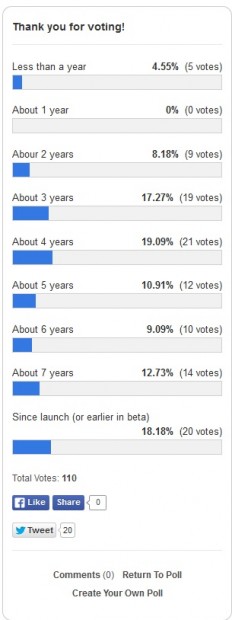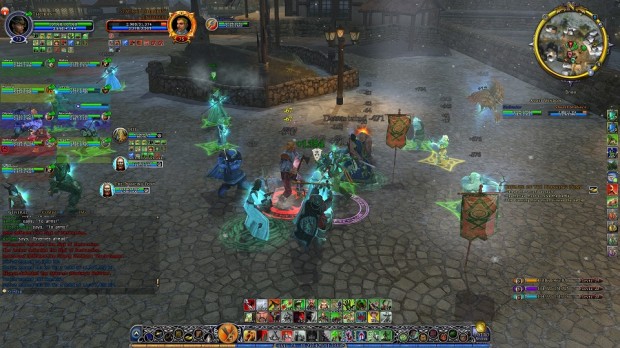Does F2P “Kill” Games? Or Is That Just Another Old-Timer Myth?
“I've been playing since beta, but I'm going to quit now because the devs killed the game!”
We hear that, or something like it, when someone has finally given up on his or her favorite online game. Often, it's followed by a pages-long forum or blog post, explaining, in great detail, how the game went to absolute hell either gradually or because of one terrible decision.
And a fair amount of the time, that singular awful decision is “it went free-to-play.”
I'm not going to delve into opinions as to why free-to-play is good or bad or whether a certain game's cash shop is fine or pay-to-win. Rather, I just want to look at cold, hard stats, and take some shot at answering this basic question: By going free-to-play, does a game do a disservice to a much larger group of older, paying players? In other words, are the “old timers” really the majority or just the “vocal minority,” like those “World of Warcraft was much better in Vanilla days” types?
I thought about this when I filled out a Lord of the Rings Online survey earlier today. I can lay legitimate claim to being an “old-timer” in that game, having started playing during open beta. Though I consider myself to be done with the game now, I answered the “How long have you been playing?” question with “Since launch (or earlier in beta).” LotRO went F2P just over four years ago, so I could assume any response of playing four years or less to be someone who started after it went F2P, while all other responses would be from people who started when the game had a subscription. (I suppose if someone started exactly four years and three months ago, that wouldn't apply, but I'll live with the slight discrepancy.)
You'd certainly expect any online game's population to be somewhat skewed toward newer players; after all, they've just started and haven't grown bored/disillusioned with the game like one who's been in it since the start. Still, for all the talk on forums and Twitter that I see from long-time players, I guess I was expecting something other than a near 50/50 split:
To be precise, that's 54 respondents who started four years or less ago and 56 who have been around longer.
Sure, this survey is small – 110 votes cast for this question when I answered it – and it allows people, like me, who are no longer playing to answer, so I wouldn't put it down as any kind of hard, definitive statement on LotRO's player base, or the player base of Free MMOs as a whole.
But if it is at least semi-accurate, then only 50% of players can claim that “F2P ruined LotRO,” since half of them weren't even around when the game had a subscription. And it's probably fewer than that who would make that claim, since at least some of the former sub-based players were OK with the F2P switch.
Me, I think LotRO's F2P transition was fine, and injected some much-needed life into the game. It's just that it was the only notable content update during a 15-month period in which we had a really unpopular raid as the top-end content. Having that, and only that, to do for so long slowly eroded away at my kinship and probably cost the game a lot of its core. But, if, as this shows, about half of the game's players came around after that, maybe it wasn't such a big factor after all and I'm just internalizing it as the reason I eventually quit playing (though I did hang on for another three years or so).
So, here's my question to you: If you're heavily into a game that is now F2P, but wasn't originally – a game like LotRO or Rift or Star Wars: The Old Republic or Team Fortress 2 – when did you start? Before the F2P switch or after? If you started before, do you think F2P “ruined” the game? If you started after, was the F2P switch the reason you started, or did you just happen to stumble upon it after it made that change?
About the Author

Jason Winter is a veteran gaming journalist, he brings a wide range of experience to MMOBomb, including two years with Beckett Media where he served as the editor of the leading gaming magazine Massive Online Gamer. He has also written professionally for several gaming websites.
More Stories by Jason WinterRead Next

With Tyranny of Dragons concluding on the Neverwinter severs soon, the release of the 5th Edition rule set for tabletop D&D players, and the general hype surrounding all of the D&D world right now, we thought this would be a g...
You May Enjoy

What else can you expect from a mad scientist?

Feature
After Penacony and Amphoreus, Honkai: Star Rail’s Latest Stop Is A Nice Break From The Trauma
Although, I can’t guarantee it’ll stay that way.

These free-to-play MMORPGs have the best tools for designing custom characters

It’s time for a dream journey through the past.



When I do the math to purchase in game what I normally would get from paying $15 a month subscription, plus the box fee of a sub game... the F2P games on average equal out to be at least 100 times more out of my pocket for the same experience and features. So for me, when I compare apples to apples I choose subscription games to play regularly.
I do play F2P games and have enjoyed them, but when my features and "quality of experience" needs upgrading I find my pocket and banking account likes the savings of a subscription over paying much more for the same options in a F2P.
So..... for me..... F2P kills the game in most cases.
F2P only kills a game, when ppl getting greedy and make it really hard Pay 2 Win or with the lack of content, bugs etc... Not always... Maybe some ppl knew Silkroad. This was really Pay 2 Win. literally (15-20$ a month minimum to be an top player). And in its peak between (would say between 2006 and 2010) it had around 30 Servers with 3.5k players on each server and there was always a Queue.
Subscription games that try to make the transition to F2P games are usually not well done simply because the game wasn't built from the start to be a F2P game, thus devs tend to go the easy route (with good reason) to monetize the game. Some do it better than others but I can say with a high degree of certainty that if the games were built from the start to be F2P they would most likley be a better final product.
F2P games that are pay2win are signing their own death certificate. This isn't the concept of F2P itself that is killing the game, merely poor decisions are made by people that don't understand the communities they are trying to server. However, in the short term these types probalby make buckets of money.
F2P games done right are a lot more profitable than a lot of people think. Some people think that F2P means less content/quality due to decreased revenue, but if you look at warframe for example they bring in about 30 mil /year in revenue, 10 of which is profit. The revenue is pretty comparable to Eve online when you take into account the player base, and 1/3 profit margin is excellent I don't think any dev studio/publisher would complain about that.
This statement is a complete and utter nonsense and anyone who claims it to be true doesn't know what hes talking about.
First of all any game rides on popularity and going F2P only increases popularity.
Second, F2P as been statistically proven is far more profitable than any P2P model so how does gaining even more profit could possibly spell the doom of a project? thats ridiculous.
----------
What really do kill games:
1. P2W
2. Generic and uninventive games kill themselves way before they even born, they kill themselves inside boring minds of boring developers.
3. Terrible communities.
4. Terrible managements.
5. Hacks, bugs, glitches, lags, bots, gold spammers, etc - all of this, sometimes even coupled together can really annoy you into quitting any game, even one made of sunshine and rainbows.
but there is a correlation between a game dying and f2p, it is that most publishers use f2p as a last resort, when the developers already had to cut costs in development and support... that's why you see p2p games that goes f2p and dies, is not the model itself, it is how much they delayed this decision... TF2 is a great example on how f2p can improve the revenue, Star Wars and Tera are great examples of how you can save a game with the f2p model
No1 can stay in 1 or 2 MMORPG cuz 100+ release aday ....
1) low quality;
2) strong competition;
3) bad management.
Now, bad management may include a poor choice of initial payment model and untimely and/or poorly executed transition to another payment model. But in the end it's bad management that is to blame and not payment models themself.
I'm not in a position say whether F2P made it worse or better.
What I can say is, that after leaving WoW I was *looking* for an F2P game though.
As we know MMO's are "slow burners" and I felt I couldn't fully know if I'd play a game long term after just 4 weeks of playing.
Basically , I didn't want to pay money for something I'd end up ditching.
Tried many games, only 2 that have stuck with me since are DDO (I'm now subbed and play regularly) and for some strange masochistic reason RFOnline (presuming there's servers up and running).
[MM]